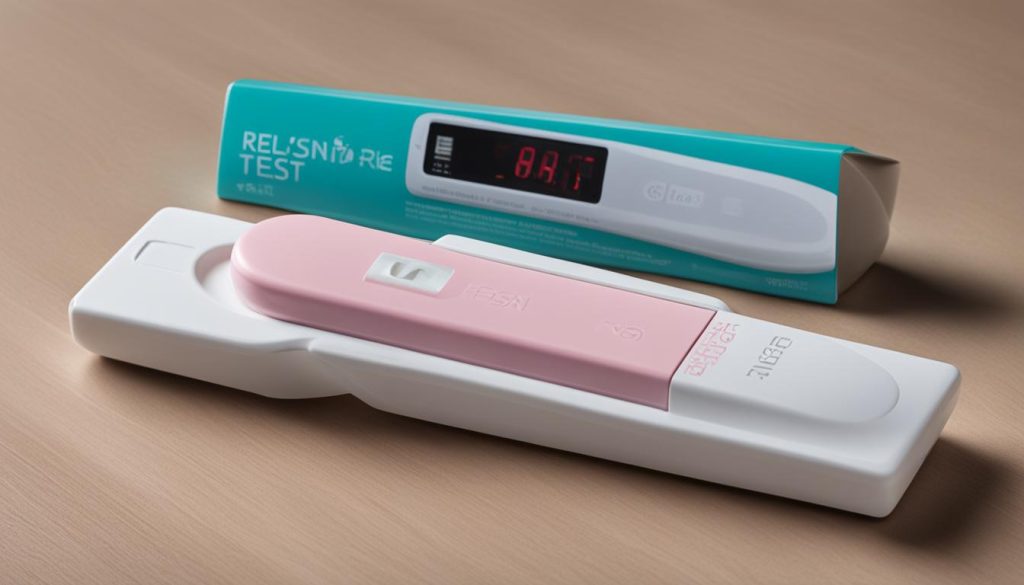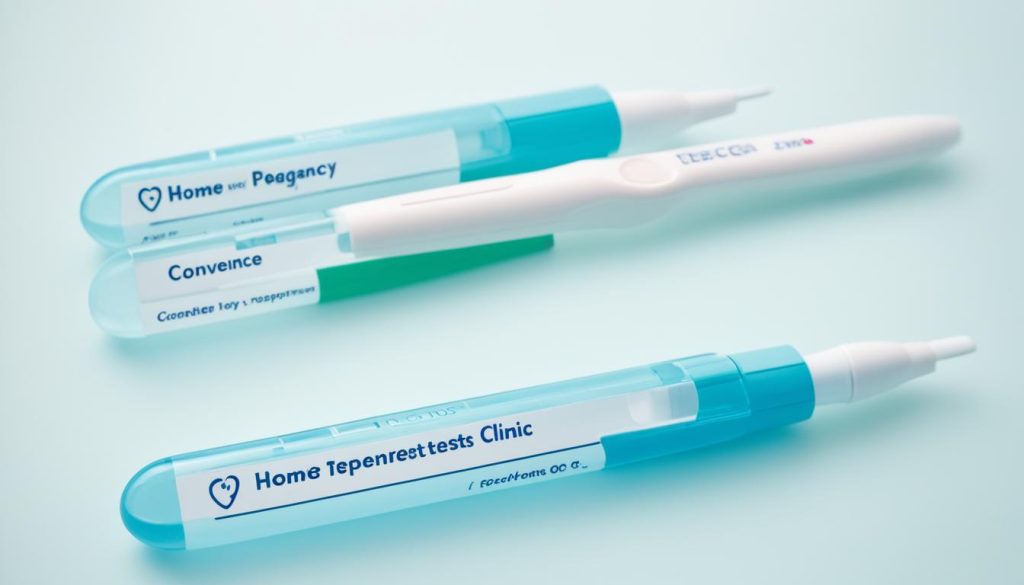When is the Best Time to Take a Pregnancy Test?
When it comes to taking a pregnancy test, timing is everything. You want to make sure you get the most accurate results possible. So, when is the best time to take a pregnancy test?
The optimal time for a pregnancy test is typically after you’ve missed your period. At this point, the hormone human chorionic gonadotropin (HCG) is present in your body at higher levels, making it easier to detect. Taking a test too soon may result in a false negative.
There are two main types of pregnancy tests: urine tests and blood tests. Urine tests, which you can do at home, are generally 99% effective when used correctly. However, it is recommended to wait until you’ve missed your period to get the most accurate result.
Blood tests, on the other hand, can detect pregnancy sooner and provide a more accurate answer within 7-10 days after conception. These tests are usually done at a healthcare provider’s office or lab.
It’s important to carefully follow the instructions provided with any pregnancy test and pay attention to the expiration date on the package. By doing so, you can ensure that you get the most reliable and accurate results.
So, remember, the best time to take a pregnancy test is after you’ve missed your period for the most accurate results. Stay tuned to learn more about how pregnancy tests work and the different types available.
How Do Pregnancy Tests Work?
Pregnancy tests are designed to detect the presence of human chorionic gonadotropin (HCG), a hormone that is produced during pregnancy. These tests can help determine if a woman is pregnant or not. There are two main types of pregnancy tests: urine tests and blood tests, each with their own mechanism of detecting HCG in the body.
Urine tests: This type of pregnancy test is commonly used and can be done at home. The test kit typically consists of a reactive paper strip that is sensitive to HCG. To perform the test, a woman collects a urine sample and either places drops of urine on the strip, holds the strip in the urine stream, or dips the strip into a cup of urine. If HCG is present in the urine, it will react with the chemicals on the strip, resulting in a positive test.
Blood tests: Blood tests are conducted by healthcare providers and are generally more sensitive than urine tests. These tests measure the amount of HCG in the bloodstream. There are two types of blood tests: qualitative and quantitative. Qualitative blood tests detect the presence of HCG and can confirm pregnancy, while quantitative blood tests measure the exact amount of HCG in the blood, providing more accurate results. Blood tests can detect pregnancy earlier than urine tests, usually within 7-10 days after conception
Different brands of pregnancy tests may have variations in the way they indicate a positive result. It’s important to carefully read the instructions provided with the test to understand what a positive result will look like. By following the instructions and using the correct testing method, both urine tests and blood tests can provide accurate results.

In summary, pregnancy tests work by detecting the presence of HCG in the body. Urine tests use reactive paper to detect HCG in the urine, while blood tests measure the amount of HCG in the blood. Both types of tests have their advantages and can help determine if a woman is pregnant or not. It’s important to choose the right test for your needs and to follow the instructions provided for accurate results.
What Are the Different Types of Pregnancy Tests?
When it comes to pregnancy testing, there are two main types of tests – urine tests and blood tests. Each type has its own advantages and is used in different situations.
1. Urine Tests
Urine tests are the most common type of pregnancy tests and can be done at home. These tests detect the presence of the hormone human chorionic gonadotropin (HCG) in the urine. HCG is produced by the placenta after fertilization and its levels increase as pregnancy progresses.
To take an at-home urine test, there are three different methods:
- Placing drops of urine on a chemical strip
- Placing the test strip in the urine stream
- Dipping the test strip into a cup of urine
Urine tests are readily available in most drug or grocery stores and are about 99% effective when used correctly.
2. Blood Tests
Blood tests, on the other hand, are typically done by healthcare providers and involve drawing a blood sample to measure the amount of HCG in the blood. These tests are more sensitive and can provide more accurate results within 7-10 days after conception. Blood tests can detect pregnancy earlier than urine tests and are often used in cases where early detection is important.
Now that you know the different types of pregnancy tests, it’s important to choose the one that suits your needs and follow the instructions carefully for accurate results.

Are All Home Pregnancy Testing Methods the Same?
When it comes to home pregnancy tests, it’s natural to wonder if all the different brands and methods yield the same results. While most brands are reliable and work by detecting the presence of the hormone human chorionic gonadotropin (HCG) in the body, there are some key differences to consider.
The main variation among home pregnancy tests lies in their sensitivity. Some tests are designed to be more sensitive, allowing them to detect HCG at lower levels and potentially provide earlier results. On the other hand, less sensitive tests may require higher levels of HCG to show a positive result. It’s crucial to be aware of the sensitivity level of the test you choose.
However, regardless of the sensitivity, it’s important to note that the most accurate results are generally obtained after you’ve missed your period. Waiting until this time increases the reliability of the test, as it allows HCG levels to rise sufficiently for detection.
When using a home pregnancy test, always follow the provided instructions carefully. Each brand may have slight variations in the testing process, such as the amount of urine needed or the time required for results to appear. Following the instructions and using the test before its expiration date will help ensure the most accurate outcome.

What are the advantages of using a home pregnancy test?
When it comes to confirming a pregnancy, home pregnancy tests offer numerous advantages. Here are some key benefits of using a home pregnancy test:
1. Cost-effectiveness
Home pregnancy tests are affordable and readily available at most drug or grocery stores. Compared to expensive medical procedures, using a home pregnancy test is a cost-effective option for women seeking to confirm their pregnancy.
2. Convenience
One of the biggest advantages of home pregnancy tests is the convenience they provide. These tests can be easily done in the comfort and privacy of your own home, eliminating the need for a visit to a healthcare provider. With a home pregnancy test, you can get quick results and gain peace of mind without any hassle.
3. Accuracy
When used correctly, most at-home pregnancy tests are about 98-99% accurate. These tests are designed to detect the presence of the hormone human chorionic gonadotropin (HCG), which is produced during pregnancy. It’s important to follow the instructions provided with the test and wait until you’ve missed your period for the most accurate results.

4. Emotional support
By taking a home pregnancy test, women have the opportunity to process the news of a potential pregnancy in a familiar and comfortable environment. This can provide a sense of emotional support and allow individuals to share the news with loved ones on their own terms.
In summary, home pregnancy tests offer cost-effectiveness, convenience, and accurate results. They empower individuals to take control of their reproductive health in a private and timely manner. However, it’s important to note that while positive results can be trusted, false negative results can occur if the test is taken too soon. If you have any doubts or concerns, it’s always recommended to consult with a healthcare professional for further guidance.
Conclusion
In summary, the best time to take a pregnancy test is after you’ve missed your period. This ensures that the levels of human chorionic gonadotropin (HCG) in your body are high enough to be detected by the test, reducing the risk of a false negative result.
There are two main types of pregnancy tests – urine tests and blood tests. Urine tests can be done at home and are about 99% effective when used correctly. It is recommended to carefully read the instructions provided with the test and follow them exactly for the most accurate result.
On the other hand, blood tests are more sensitive and can provide more accurate results within 7-10 days after conception. If you receive a positive result, it’s important to follow up with a healthcare provider for further confirmation and guidance.
To ensure the most accurate results and peace of mind, it’s best to consult a healthcare professional and discuss your results and concerns. They can provide the necessary guidance, support, and medical advice throughout your pregnancy journey.
FAQ
1. How do pregnancy tests work?
Pregnancy tests work by detecting the hormone human chorionic gonadotropin (HCG) in the body. Urine tests use reactive paper to detect HCG in the urine, while blood tests measure the amount of HCG in the blood.
2. What are the different types of pregnancy tests?
There are two main types of pregnancy tests – urine tests and blood tests. Urine tests can be done at home and are about 99% effective when used correctly. Blood tests, on the other hand, are more sensitive and can provide more accurate results within 7-10 days after conception.
3. Are all home pregnancy testing methods the same?
No, different brands of home pregnancy tests may have different levels of sensitivity. Some tests are more sensitive and able to detect pregnancy earlier than others. It’s important to read and follow the instructions provided with the test for the most accurate result.
4. What are the advantages of using a home pregnancy test?
Home pregnancy tests are inexpensive, readily available, and easy to use. They generally provide quick results and can be done in the privacy of your own home. Most at-home pregnancy tests are about 98-99% accurate when used correctly.




